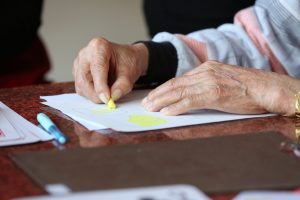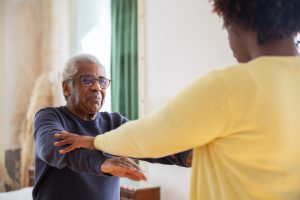How to Help Your Senior After a Stroke
Having a stroke completely changes a person’s life, often never going back to the way things were. It’s a constant uphill battle of regaining strength, mobility, and independence. It can be a frustrating process for both the person and their family. Here are some ways you can help your senior overcome the aftermath of a stroke.
Avoid Micromanaging
In other words, don’t do everything for the person! After a stroke, the body is relearning how to do things, rebuilding neuropathways in the brain. This is known as neuroplasticity. To do this, the person must perform activities repetitively. By jumping in and taking over you are slowing the recovery process.
Encourage practice
Practice makes progress. Your senior is going to return home with a slew of therapy exercises to help their body rebuild strength. It can be an overwhelming and discouraging process. Make yourself available to help your senior run through these exercises every day, providing support where needed. In some cases, a stroke my case damage to the frontal lobe, the area of the brain responsible for planning ahead and staying on track. Friendly reminders for your senior that it’s time to get exercising may be the push they need to stay consistent.
Remember the emotional side of stroke
Having a stroke doesn’t just affect the physical aspects of the body. Emotionally, strokes can cause depression and anxiety issues, fatigue, and confusion. Showing emotional support for your senior is just as important as helping them get dressed in the morning.
Helping your senior hold on to aspects of their pre-stroke life can be the mood booster they need. To avoid isolation issues, help your senior stay in contact with friends and loved ones. Video calling or in-person visits (if they are up for it) are a great place to start. Remember, your presence alone is enough to boost their mood. Be sure to engage in thoughtful conversation or try reading from their favorite book or magazine while you’re with them. Music is another great way to infuse joy into their day.
Be patient
Depending on the severity of the stroke, your senior may have a difficult time communicating. Just remember, they can hear you so there’s no need to shout or use hand signals! The person is frustrated that they can’t communicate properly with you so just take it slow. Know that it may take some time to understand each other.
You are not in this alone. Our Adult Foster Care and Group Foster Care caregivers are with you every step of the way to ensure your loved one is getting the care and attention they need. Learn more.








